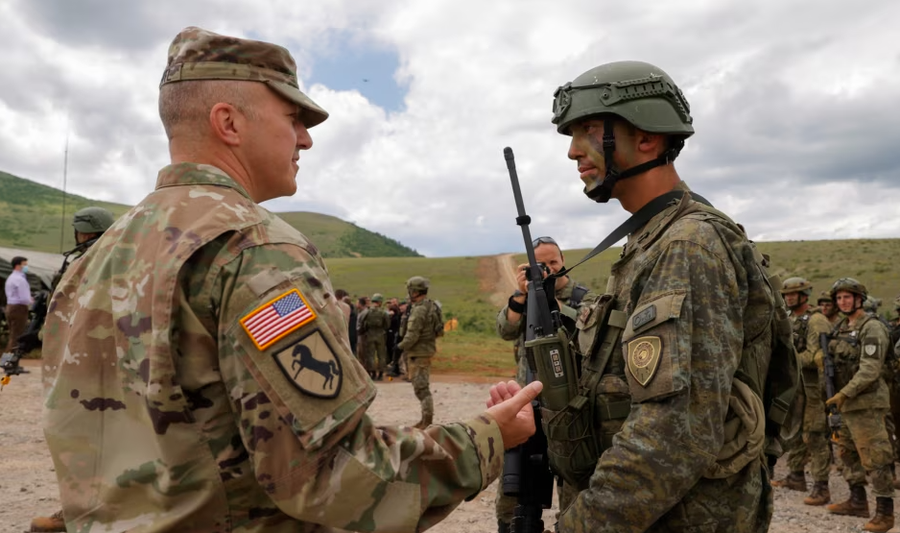
The Kosovo Security Force (KSF) and the US Department of Defense signed the Communications Interoperability and Security Agreement, known as CISMOA, on May 13. What is this pact and how does it help Kosovo?
The secure exchange of information and increased interoperability between the United States military and the Kosovo Security Force (KSF) has been formalized with a pact between the two countries.
The Communications Interoperability and Security Agreement (CISMOA) was signed on May 13 by American Major General John Phillips and Kosovar Lieutenant General Bashkim Jashari in Pristina.
Kosovo is the 33rd country with which the US has signed such an agreement.
The US Embassy in Pristina described the pact as "a major step forward in strengthening and securing both nations", while the Kosovar side described it as an agreement "of particular importance".
What is CISMOA?
The US signed the CISMOA with international partners to enable the secure exchange of sensitive military information and the use of advanced communications equipment.
Kosovo's acting Minister of Defense, Ejup Maqedonci, explains to Radio Free Europe (RFE/RL) that the US is among the main partners in military cooperation, from which the KSF obtains "most of its weapons and equipment."
Among them are those with advanced technology, with cryptographic data, and that "have many sensitive elements in themselves."
CISMOA, says Maqedonci, "enables us – in addition to continuing our purchases – to have these devices compatible with devices and systems in the US."
Former Chief Inspector of the Kosovo Intelligence Agency and expert on security issues, Burim Ramadani, tells REL that the new pact represents an element of symbolism and US support for Kosovo, particularly for the security sector.
CISMOA, according to Ramadani, "means that the KSF advances in communication and use of the same equipment, in the same system, in the same line with the US military, in cases of joint operations and interoperability."
He adds that the agreement also includes the exchange of information and military intelligence.
"This is a pretty important part. As soon as we say 'exchange of information' it is known that we are talking about classified information," Ramadani emphasizes.
How does CISMOA help Kosovo?
Kosovo authorities say that the content of the new agreement with the US covers many areas and aspects of military cooperation.
Most of the agreement is classified and cannot be transparent to the public, according to the Kosovo Ministry of Defense.
However, on issues that are already known to the public, the Macedonian explains in concrete terms what Kosovo benefits from CISMOA.
For example, the Javelin anti-tank missile system, which Kosovo is in the process of purchasing, according to Macedonci, contains data that has a connection to advanced technology.
CISMOA enables the KSF to have direct access, through a secure communication channel, to sensitive data contained in the system, as well as to update that data for more effective use, he says.
"So, we don't need additional requests and bureaucratic procedures, but this agreement allows us access to data, to sensitive and classified elements of this system, and which have their basis in the US," emphasizes Makedonci.
He adds that CISMOA provides the same access to classified elements for American Black Hawk helicopters, which Kosovo authorities have publicly expressed interest in having in the KSF inventory.
This agreement, as Macedonci says, opens up the opportunity for the Kosovo Ministry of Defense to continue purchasing equipment and weapons from the US, according to the "state-to-state" concept, by procuring directly with the American government.
Countries that are not part of CISMOA cannot have this access to updated data on military equipment with sensitive elements and GPS [Global Positioning System], without a special request from them and without special approval from the US, says the Acting Minister of Defense of Kosovo.
The secure communication system, which CISMOA guarantees, is considered essential for countries that want to build military partnerships, and as such the partnership can be based on mutual trust.
Ramadani emphasizes that reliability is related to the secure exchange of information and communication with secure equipment between the two armies.
In this specific case, according to him, the KSF will advance in using the secure line with the US.
This, according to Ramadani, means direct communication - with the same equipment and the same system, between the two armies - in which security measures and information exchange are high.
"So, they cannot be intercepted by hostile states or organizations," Ramadani emphasizes.
Although each country's armies have their own rules of internal functioning and communication, Ramadani says that, with the agreement reached, in the event of any interaction between KSF units and US army units, in any peacekeeping mission or joint military exercise, only the US army's internal functioning rules would apply.
"The KSF and the US military will have the same procedures and standards, as well as the same way of operating. So, as if [the KSF] were a unit of the US military, in terms of the communication system with them," he explains./ REL (A2 Televizion)











